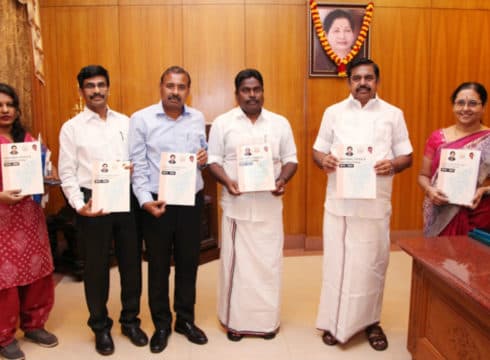Tamil Nadu Startup Fund of Fund will be created with a corpus of INR 250 Cr
The policy aims to make Tamil Nadu a global innovation hub for startups by 2023
The state government has now set a five-point action plan for implementing the policies
Inc42 Daily Brief
Stay Ahead With Daily News & Analysis on India’s Tech & Startup Economy
As one of the emerging states under DIPP’s State Startup Ranking framework, Tamil Nadu has now taken the step forward by launching its Startup and Innovation policy 2018-2023, which was unveiled by the state’s chief minister K. Palaniswami on Saturday (January 19, 2019).
The policy has been introduced with a mission of providing an enabling ecosystem for startups registered in the state and to make Tamil Nadu a global innovation hub for startups’ by 2023. The mission shall aim for a minimum of creating 100K high skilled jobs, direct and indirect, in the startup ecosystem.
In June 2018, union minister Suresh Prabhu had asked the Tamil Nadu government to release its startup policy to boost the number of jobs in the state. Prior to this, the Tamil Nadu government had sought inputs from industry stakeholders to prepare the state’s draft policy.
Tamil Nadu Startup Fund Of Funds
The new policy includes setting up of a startup fund, to be called Tamil Nadu Startup Fund of Funds, with a corpus of INR 250 Cr ($21 Mn) for investments in startups. It will be managed by a professional financial agency such as the Small Industries Development Bank of India.
The first tranche of INR 25 Cr ($3.5 Mn) will be allotted in the financial year 2019-2020. It will be registered as an Alternative Investment Fund (AIF) under Securities and Exchange Board of India (SEBI) regulation, 2012.
“The fund will be invested in other SEBI registered AIFs for investment in Startups and MSMEs established in Tamil Nadu. The government of Tamil Nadu will invest INR 75 Cr ($10.5 Mn) in the fund,” the policy stated.
Startup Action Plan
The Tamil Nadu government has now set a five-point action plan for implementing the policies. This includes creating ecosystems for encouraging innovations, ensuring resources availability to the startup ecosystem, enabling skill development and job creation, supporting social entrepreneurship and establishing global accessibility and partnerships.
To be recognised as a startup in the state, a startup needs to be registered under Tamil Nadu Startup and Innovation Mission (TANSIM), date of incorporation is less than seven years (less than 10 years in case of biotechnology, AI and ML startups) at the time and registration and turnover less than INR 25 Cr ($3.5 Mn) in any of the financial years.
As reported earlier, Entrepreneurship Development Institute of India (EDII) will act as a nodal agency to promote and facilitate startups. Also, TANSIM will be headed by a full-time officer who will advocate and oversee policies and programmes for promoting startups.
Boost Technology Startups In The State
Under the new policy, the state government will be curating at least 5,000 technology startups of which at least 10 global high growth startups in social impact sectors will be selects.
At the same time, it will also provide infrastructure support to strengthen existing mechanism in areas like Internet of Things (IoT), artificial intelligence (AI), machine learning (ML) and software as a service (SaaS) are some of the core objectives of the policy.
The policy also aims to collaborate with educational institutions to promote entrepreneurial spirit, reduce existing regulatory and tax burden on startups in the field of labour, pollution and building norms and also partner with reputed investors across the globe to bring investment to the Tamil Nadu startups.
It will also nurture aspiring entity or individuals (defined as ‘Start Steps’) who develops potentially scalable business model that can generate wealth and employment.
Tamil Nadu Startup Seed Grant Fund
The new startup policy also mandates setting up of Tamil Nadu Startup Seed Grant Fund (TNSSGF) of INR 50 Cr ($7 Mn). In the first year, INR 5 Cr ($700.15K) will be allocated in partnership with financial institutions and universities for supporting early-stage financing requirements of the startups in the form of grants to fill the gap in fund requirement for research and innovations.
The TNSSGF would also provide funding for Idea-to-PoC (Proof of Concept) stages which are pre-start-up activities.
Incubator Support
Under the startup and innovation policy, the state and central public sector undertakings (PSU) shall be encouraged to adopt incubators and channelise their corporate social responsibility (CSR) funds.
These incubators shall also serve as an innovation sandbox to solve problems faced by the state/central PSUs which, in turn, shall support startups with access to platform, test bed, data, handholding and others.
{{#name}}{{name}}{{/name}}{{^name}}-{{/name}}
{{#description}}{{description}}...{{/description}}{{^description}}-{{/description}}
Note: We at Inc42 take our ethics very seriously. More information about it can be found here.


